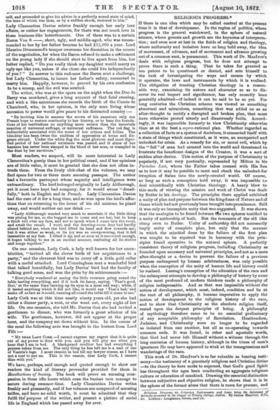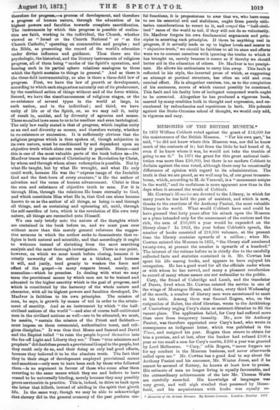REF .IGIO US PROGRESS.* If there is one idea which
may be called central at the present time it is that of development. In the region of politics, where progress is the general watchword, in the sphere of natural science, where genesis and growth are the keynotes of interpreta- tion ; and even now at last in the fields of religion and theology, where uniformity and isolation have so long held sway, the idea of movement, of advance, and of movement and advance growing out of a common root, is paramount. This work of Dr. MacIvor's deals with religious progress, but he does not attempt to prove there is such a thing. That he takes for granted as too patent to be questioned or denied, and sets himself to the task of investigating the ways and means by which it operates, the laws and instruments by which it is realised. The obligation of treating Christian theology in a reason- able way, examining its nature and character so as to dis- cover its real import and significance, has only recently been generally admitted—if indeed it can be said to be so yet. For long centuries the Christian scheme was viewed as something abnormal and miraculous, something that was added on as an after-thought to rectify a disrupted and broken plan, that must have otherwise proved utterly and disastrously futile. Accord- ingly, it was impossible formerly to view Christianity otherwise than as at the best a supra-rational plan. Whether regarded as a collection of facts or a system of doctrines, it connected itself with a state of things which constituted, as it were, an unexpected and unlooked-for crisis. As a remedy for sin, or moral evil, which by the "fall" of man had entered into the world and threatened to frustrate the beneficent designs of the Creator, it was a sort of sadden after-device. This notion of the purpose of Christianity is popularly, if not very poetically, represented by Milton in his Paradise Lost, where the Father takes counsel with His Son as to how it may be possible to meet and check the unlooked-for irruption of Satan into the newly-created world. Of coarse, so long as such a conception held sway, it was impossible to deal scientifically with Christian theology. A heavy blow to this mode of viewing the mission and work of Christ was dealt by Butler in his Analogy. The principles there applied exhibited a unity of plan and purpose between the kingdoms of Nature and of Grace which had not previously been brought into prominence. Still it was only an incomplete unity that was suggested. It was shown that the analogies to be found between tile two spheres testified to a unity of authorship of both. But the remnants of the old idea clung even to Butler. Unity of authorship did not necessarily imply unity of complete plan, but only that the manner in which the mischief done by the failure of the first plea was sought to be repaired was in harmony with the prin- ciples found operative in the natural sphere. A perfectly consistent theory of religious progress, including Christianity as founded upon necessary and universal principles, and not as a mere after-thought or a device to prevent the failure of a previous. purpose endangered by human arbitrariness, was only possible when the conception of the unity of human life and history could. be realised. Lessing's conception of the education of the race and the subsequent attempts to develop a philosophy of history by some of the most profound of, modern thinkers made a philosophy of religion indispensable. And as that was impossible without the notion of development, which must, indeed, condition and lie at the root of all philosophy, it became imperative to apply the notion of development to the religious history of the race, and to show that Christianity as the absolute religion itself, rested upon the deepest principles of being. A philosophy of mythology therefore came to be an essential preliminary of any acceptable philosophy of Revelation. Heathendom, Judaism. and Christianity were no longer to be regarded as isolated from one another, but all as co-operating towards common ends. It was found, in other and apostolic words, that God had never left Himself without a witness through the long centuries of human history, although in the times of men's ignorance He may have appeared to wink at the transgressions and wanderings of the race.
This work of Dr. MacIvor's is so far valuable as bearing testi- mony—the testimony of a genuinely religious and Christian divine —to the theory he here seeks to expound, that God's good Spirit has throughout the ages been conducting an aggregate religious culture or education of mankind. Drawing the essential distinction between subjective and objective religion, he shows that it is in the sphere of the former alone that there is room for process, and
Religious Progress, its Criterion, Instruments, and Laws. being the Substance of Sermons preached in the Chapel of Trinity College, Dublin. By James Madvor, Ac. London: Longman, Green, and Co. therefore for progress,—a process of development, and therefore a progress of human nature, through the education of its highest powers and faculties towards complete sanctification. The instruments by which this progress is possible of realiza- tion are faith, working in the individual, the Church, whether 'viewed as " Israel or the Church National " or " as the Church Catholic," operating on communities and peoples ; and the Bible, as presenting the record of the world's education under divine influence and guidance. Thus there are the psychologic, the historical, and the literary instruments of religious progress, all of them being "modes of the Spirit's operation, and bearing each in its partial sphere relations analogous to those which the Spirit sustains to things in general." And as there is the three-fold instrumentality, so also is there a three-fold law of progress. First, we have the law of growth or development, according to which each stagearises naturally out of its predecessor, by the combined action of things without and of the force within. Second, we have the simultaneousness of religious stages, or the co-existence of several types in the world at large, in eaeh nation, and in the individual ; and third, we have unity of life or of the Spirit, or, as we may call it, unity of result in, amidst, and by diversity of agencies and means. These so-called laws seem to us to be needless and even tautological. The only law really stated is that of progress, which implies unity as an end and diversity as means, and therefore variety, whether in co-existence or succession. It is sufficiently obvious that the religious progress which is thus spoken of, though subjective in its own nature, mast be conditioned by and dependent upon an objective truth which alone can render it possible. Hence—and this is one of the most valuable parts of the book before us—Dr. Maclvor traces the nature of Christianity as Revelation by Christ, by whom and through whom alone redemption is possible. Not by what He taught, but by what He wrought, and what He only could work, because He was the "express image of the Invisible God and the first-born of every creature," is He the author of -salvation and the cease of human advancement. Christ is thus the sum and substance of objective truth to man. For it is through Him, through the relations He bears eternally to God, and which constitute Him what He is, that God can alone become known to us as the author of all things, as being in and through all things, and as sustaining and upbearing all, until, through the self-sacrifice of love, which is the revelation of His own very nature, all things are reconciled unto Himself.
We can only briefly note the nature of the thoughts which are contained in the book before us, and we must pass over without more than this merely general reference the sugges- tive sermons in which the author seeks to demonstrate that re- ligion is both natural and scientific, and that accordingly it ought to welcome instead of shrinking from the most searching analysis and the most thorough investigation. There is one point, however, on which we must touch before closing, because it is utterly unworthy of the author as a thinker, and because it will, and justly, tend greatly to weaken the force and effect of the gospel—in many respects broad, manly, and masculine—which he preaches. In dealing with what we may term the provisional means by which men are to be trained and -educated to the higher sanctity which is the goal of progress, and which is constituted by the harmony of the whole nature and -.character, with all its highest powers and faculties developed, Dr. Maclvor is faithless to his own principles. The mission of man, he says, is growth by means of toil in order to the attain- ment of sanctity. And as an instrument by which " the half- civilised nations of the world "—and also of course half-cultivated men in the civilised nations as well—are to be educated, we must, be asseits, " sustain the mission of the Priest and Sabbath— must impose on them ceremonial, authoritative tenet, and reli- gious discipline." It was thus that Moses and Samuel and David and the Baptist toiled "to raise the people beyond themselves into the far-off Light and Liberty they see." These "true ministers and prophets" diddoubtless preach a provisional Gospel to the people, but they could only do so, and their doing so only had good effects, because they believed it to be the absolute truth. The fact that -they in their stage of development employed provisional means and sanctions—only seen to have been such by those who followed them—is no argument in favour of those who come after them reverting to the same means which they see and believe to have -ceased to be universally binding, merely because they may possibly prove serviceable in practice. This is, indeed, to drive us back upon the letter that killeth, instead of abiding in the spirit that giveth life. Ia the same way, though we may be able to acknowledge that slavery did in the general economy of the past perform use- ful functions, it is preposterous to aver that we, who have come to see its essential evil and sinfulness, ought from purely utili- tarian considerations to revert to it, and compel the " half-civil- ized " races of the world to toil, if they will not do so voluntarily. Dr. Maclvor forgets his own fundamental arguments and prin- ciples in asserting such principles. If there be anything real in progress, if it actually leads us up to higher levels and nearer to "objective truth," we should be faithless to all its aims and efforts were we to content ourselves with ignoring the truths to which it has brought us, merely because it seems as if thereby we should better aid in the education of others. Dr. Maclvor is too precipi- tate. He allows his enthusiasm to carry him away. This fault is reflected in his style, the inverted prose of which, as suggesting an attempt at poetical structure, has often an odd and even comical effect. He is altogether careless, too, as to the completion of his sentences, scores of which cannot possibly be construed. This fault and his faulty love of inelegant compound words ought to be corrected. Altogether he has produced a vigorous book, marred by many crudities both in thought and expression, and en- cumbered by redundancies and repetitions in both. His polemic against the Scoto-Oxonian school of thought, we would only add, is vigorous and racy.

































 Previous page
Previous page